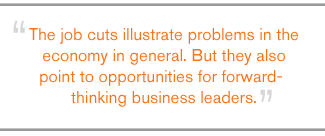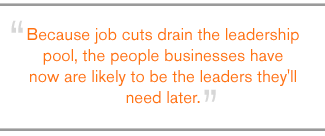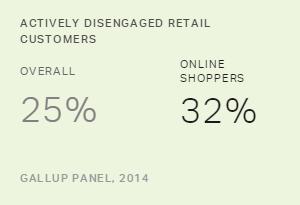Few events are more traumatic than losing your job. In fact, according to the well-known Holmes-Rahe Social Readjustment Scale, there are only seven events that are more stressful than getting fired, and they mostly involve death, divorce, a major injury or illness, or prison. Lately, though, a lot more people may be experiencing the stress of a job loss. There were 8.5 million Americans unemployed in May -- 1.6 million more than a year ago.
 |
"The unemployment rate shot up by half a percentage point in May, the biggest single-month increase in over twenty years," says Alan Krueger, the Bendheim Professor of Economics and Public Affairs at Princeton University and former chief economist at the U.S. Department of Labor. "So from the standpoint of the labor market, it's certainly a downturn and I think one that we will be slow to recover from."
The job cuts have hit the retail and financial services sectors hard, and they illustrate problems in the economy in general. But they also point to opportunities for forward-thinking business leaders.
Retail and financial services
Since March 2007, 184,000 retail jobs have been cut, and more cuts are coming. According to Kurt Deneen, Â鶹´«Ă˝AV principal and expert on the retail industry, specialty retailers and small stores are the first to let people go. "For example, one major retailer just announced they're closing more than one hundred stores," Deneen says. "They've got thirty-plus people in every one of those stores. They can farm some of those folks out, but still, that's a lot of people, and that's only one chain."
One reason the retail industry is cutting jobs is because of the slowing economy. Fewer shoppers mean fewer sales, so fewer salespeople are needed. However, employees are consumers too. Unemployment, even in a single sector, can fuel the national cycle of reduced spending and increased job loss -- even if those losing their jobs didn't earn much in the first place.
Deneen notes that when retail stores cut jobs, part-timers are often the first to go. But full-timers aren't safe either. "The idea that the people losing their jobs are all high school kids is a bit dismissive," Deneen says. "Some of these people may be kids, but many aren't, and this is a rent check for them."
The job loss situation is even more acute in financial services. According to Challenger, Gray & Christmas, the financial industry leads all other sectors in job cuts this year by a wide margin; financial firms have announced more than 66,000 job cuts so far in 2008.
Douglas Berlon, Â鶹´«Ă˝AV's global practice leader for financial services, says the job cuts in the financial industry, like those in retail, are hitting various levels of labor. "It's coming mostly in middle management, very low-end jobs, and niche lines of business," Berlon says. "The volume of work is slowing down, so banks need fewer managers and processors. This is especially true for the small business, home loan, and home equity business lines. Those business lines are the bread and butter for many banks."
Now what?
Many of the 8.5 million people out of work are anxiously searching for a job. But will they find one? "It may take a while. Most will find a job," says Krueger. "But when the economy slows down, the duration of unemployment tends to increase. Some people will have a great deal of difficulty finding a new job."
Part of that difficulty is that businesses are cutting workers and ratcheting down hiring. Â鶹´«Ă˝AV's Net New Hiring Activity measure fell 1.1 percentage points from March to April and declined by 2.2 points between April and May. (See "Net New Hiring Activity Suggests U.S. Lost Jobs in May" in the "See Also" area on this page.)
According to Deneen, people working in retail may have the easiest time finding new work, assuming that the recently unemployed have access to the retail outlets that are likely to be hiring. "Full-time workers will find that big-box retailers and discount retailers are still hiring," says Deneen.
Things are going to be tougher in financial services. The job cuts are coming in lines of work that have been hit hard in recent months -- and when people aren't buying houses, for instance, mortgage departments aren't busy. So making lateral moves from one bank to another could be difficult.
However, many financial institutions are hiring people with the right attributes. "If you have transferable skills, there are probably opportunities," says Berlon. "Banking is still in desperate need of talented, highly motivated, engaged people in the customer-facing world." The problem is that taking the job could mean sacrifice, sometimes more than the jobless can bear. "The job might not be at the same salary level, it might not be in the same town, and it probably won't be the same role they had before," Berlon says.
The tide will turn
Significant unemployment increases usually presage a hiring bounce. When that happens, however, it may be too late for today's jobless. Krueger doubts that the Federal Reserve Board will cut rates any time soon and that the government stimulus checks will "have much of an impact on employment." He also believes that the job market will be slow to recover.
 |
Nor is he delighted with the $150 billion stimulus package that Congress passed earlier this year. "I would give it a grade C," says Krueger. "It was swift and bipartisan, which is unusual. On the other hand, it omitted unemployment insurance, which I think was a serious mistake." In fact, Krueger argues that for an economic stimulus package to do much good, it should "stimulate the economy, not worsen the long-term government budget imbalance; help those who are hurting the most because of the recession; and extend unemployment benefits in the areas where unemployment is highest," he says.
On the other hand, Krueger is quick to point out that the United States is not in a recession, the American labor situation is very flexible, and Congress still has time to improve its economic stimulus efforts. So, though the short-term outlook may be gloomy, it's far from hopeless. Even in the hard-hit financial services sector, things aren't as dire as they may seem.
"There absolutely are growth opportunities -- banks just have to make sure that they are retaining and engaging employees in the key business lines that will help them grow, now and in the future," says Berlon. "Banks must figure out what they have to do to shore up their base and build for the future. And smart banks are doing that."
Interestingly, according to Berlon, tough times provide an excellent opportunity for financial institutions to position themselves to take advantage of better times to come. Banks in particular should understand the way the economy works, and those that best serve consumers and small businesses will earn, as Berlon puts it, "the kind of confidence that will 'pay forward' and help them through this slowdown period." During an economic downturn, banks can also pick and choose among the available labor and lure the most talented hires.
Both tactics, however, require great efficiency and excellent management. "There are a lot of talented people currently in banking and available for hire, but the big need is making sure that the management of those people is top-notch," Berlon says. "Because great management is what's going to engage those workers even further and help them do their jobs more effectively."
Deneen says that the harsh retail situation presents similar opportunities. Though across-the-board cuts in the front lines reduce the leadership pool and create service challenges for those who are left, tough times are also good times to implement better management strategies. "Quite frankly, 'hiring the best' is a service strategy that, if done right, could actually benefit retailers. But retailers don't typically think about that until times get tight," Deneen says. "Yet when things are tight, you really need to think about whether the people you've got are engaged and engaging customers."
Both Berlon and Deneen recommend that managers take a very close look at the employees they have left. Because job cuts drain the leadership pool, the people businesses have now are likely to be the leaders they'll need later, so it's crucial to start identifying and grooming them right away. (See "Start Finding Tomorrow's Leaders Now" in the "See Also" area on this page.)
What's more, all employees need to be cultivated to create customer engagement. The customers who develop an emotional attachment when times are tough are likely to be intensely devoted when things improve. Finally, the efficiencies gained by employee engagement -- such as reduced absenteeism, reduced turnover, fewer workers' compensation claims, higher productivity, and increased sales -- are increasingly valuable as profits are squeezed.
The silver lining
The reason that the life events on the upper end of the Holmes-Rahe scale are so devastating is that they represent dramatic change -- and the more drastic and unexpected the change, the more stressful the life event. There are few things more devastating than a pink slip, as millions of Americans are discovering.
But if there's a silver lining to the labor downturn, it's the erosion of organizational inertia. When things change for the worse, businesses have to evolve. This gives them the incentive to make adjustments that in good times seem unnecessary or even frivolous.
So when customers are scarce and money is tight, closer attention to the customer, better management, and an emphasis on employee engagement can create margins that will keep companies running. These strategies also make businesses more profitable and set them up to take advantage of the economic upswing when it comes.
